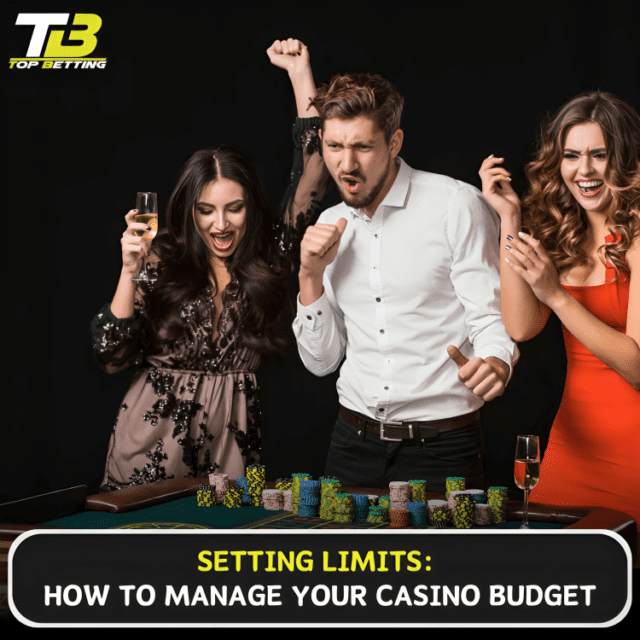
How to Manage Your Casino Budget
Step into the world of casinos, where the lights are bright and the stakes are high. As a casino enthusiast, it’s easy to get caught up in the excitement and lose track of your spending. That’s why it’s essential to set limits and manage your casino budget effectively.
The Importance of Managing Your Casino Budget
Managing your casino games budget is crucial to ensure that your gambling experience remains enjoyable and financially responsible. Without proper budgeting, it’s easy to fall into the trap of overspending and chasing losses. By setting limits, you take control of your finances and minimize the risk of getting into financial trouble.
Setting limits also helps you maintain a healthy balance between entertainment and financial stability. It allows you to enjoy the thrill of gambling without jeopardizing your financial well-being. By understanding the importance of managing your casino budget, you can make informed decisions that enhance your overall casino experience.
Effective budget management is not about restricting your fun but rather about enhancing it. When you have a clear budget in place, you can gamble with peace of mind, knowing that you are within your financial means. This sense of control can lead to a more enjoyable and stress-free casino experience.
Understanding the Risks of Overspending at a Casino
Overspending at a casino can have serious consequences that extend beyond financial losses. It can lead to feelings of guilt, anxiety, and even depression. The lure of the game and the adrenaline rush of winning can cloud judgment, making it easy to spend more than originally intended.
Moreover, overspending at a casino can strain relationships with loved ones and impact your overall well-being. It’s essential to recognize the risks associated with overspending and take proactive steps to avoid falling into this trap. By understanding the psychological and emotional implications of overspending, you can make more informed decisions when gambling.
One of the key risks of overspending at a casino is the potential for developing a gambling addiction. When spending spirals out of control, it can lead to a compulsive gambling behavior that is difficult to break. Recognizing the warning signs of overspending and taking corrective action early on is essential to prevent the negative consequences of a gambling addiction.
Setting a Realistic Casino Budget
Setting a realistic casino budget is the foundation of responsible gambling. Before you set foot in a casino, it’s important to determine how much money you can afford to spend on gambling without impacting your financial obligations. Your budget should be based on your disposable income after accounting for essential expenses such as bills, savings, and other financial commitments.
When setting your casino budget, consider factors such as the frequency of your visits to the casino, the games you intend to play, and your risk tolerance. It’s crucial to be honest with yourself about your financial situation and set a budget that aligns with your income and lifestyle. By setting realistic limits, you can enjoy the thrill of gambling without the stress of financial strain.
In addition to setting an overall budget, it’s also helpful to establish limits for individual gaming sessions. This can help you pace yourself, avoid impulsive decisions, and prevent excessive losses. By breaking down your budget into smaller increments, you can maintain better control over your spending and make your casino experience more sustainable.
Tips for Sticking to Your Casino Budget
Sticking to your casino budget requires discipline and self-control. To help you stay within your financial limits, consider implementing the following tips:
- Set spending limits: Determine in advance how much money you are willing to spend during each visit to the casino. Once you reach your limit, walk away.
- Use cash: Consider using cash instead of credit or debit cards to limit your spending to the amount you have on hand.
- Take breaks: Schedule regular breaks during your gaming sessions to reassess your spending and avoid impulsive decisions.
- Avoid chasing losses: Accept that losses are part of gambling and resist the urge to chase them by increasing your bets.
- Track your spending: Keep a record of your wins and losses to stay accountable and make informed decisions about your gambling behavior.
By incorporating these tips into your gambling routine, you can develop healthy habits that support responsible gaming and help you stick to your budget.
Tools and Resources for Managing Your Casino Budget
In the digital age, there are numerous tools and resources available to help you manage your casino budget effectively. From budgeting apps to self-exclusion programs, these resources can provide valuable support in your journey towards responsible gambling.
Budgeting apps such as Mint, YNAB, and PocketGuard can help you track your casino spending, set financial goals, and monitor your progress over time. These apps offer insights into your spending habits, identify areas where you can cut back, and encourage mindful money management.
Self-exclusion programs, such as GamStop and BetBlocker, allow you to restrict your access to online gambling sites and casinos. By voluntarily excluding yourself from these platforms, you can take a proactive step towards controlling your gambling behavior and avoiding potential financial harm.
In addition to digital tools, seeking support from counseling services, support groups, or helplines can provide emotional assistance and guidance for individuals struggling with gambling addiction. These resources offer a safe space to discuss your concerns, learn coping strategies, and connect with others facing similar challenges.
Recognizing the Signs of a Gambling Problem
Recognizing the signs of a gambling problem is essential for early intervention and treatment. Common indicators of a gambling problem include:
- Preoccupation with gambling: Constantly thinking about gambling activities and planning your next visit to the casino.
- Chasing losses: Attempting to recoup losses by increasing the frequency or intensity of your gambling.
- Lying about gambling: Hiding your gambling behavior from loved ones or downplaying the extent of your financial losses.
- Neglecting responsibilities: Prioritizing gambling over essential tasks such as work, family obligations, or personal well-being.
If you or someone you know exhibits these signs, it’s important to seek help from a professional counselor or addiction specialist. Gambling addiction is a serious condition that can have far-reaching consequences, but with early intervention and support, recovery is possible.
How to Seek Help for a Gambling Addiction
Seeking help for a gambling addiction is the first step towards regaining control of your life. There are various treatment options available to individuals struggling with compulsive gambling behaviors, including therapy, support groups, and medication.
Therapy, such as cognitive-behavioral therapy (CBT), can help individuals identify and change negative thought patterns and behaviors associated with gambling. By addressing underlying issues and developing coping strategies, therapy can support long-term recovery and prevent relapse.
Support groups, such as Gamblers Anonymous, provide a supportive environment for individuals to share their experiences, receive encouragement, and connect with others on a similar journey. These groups offer a sense of community and understanding that can be instrumental in overcoming the challenges of addiction.
In some cases, medication may be prescribed to individuals with co-occurring mental health conditions or severe gambling disorders. Medications such as antidepressants or mood stabilizers can help manage symptoms of anxiety, depression, or impulse control related to gambling addiction.
Strategies for Responsible Gambling
Responsible gambling involves making informed decisions about your gaming behavior and setting boundaries to protect yourself from harm. To practice responsible gambling, consider implementing the following strategies:
- Set time limits: Allocate a specific amount of time for gambling activities and stick to it to avoid excessive play.
- Play for entertainment: View gambling as a form of entertainment rather than a way to make money, and set realistic expectations for your outcomes.
- Balance gambling with other activities: Engage in hobbies, social outings, and self-care practices to maintain a well-rounded lifestyle outside of gambling.
- Seek support: Reach out to friends, family members, or professionals for emotional support and guidance when facing challenges with gambling.
By incorporating these strategies into your gambling routine, you can cultivate a healthy relationship with gaming and minimize the risks associated with compulsive behaviors.
The Benefits of Self-Exclusion Programs
Self-exclusion programs offer a valuable tool for individuals seeking to control their gambling habits and avoid potential harm. By voluntarily excluding yourself from casinos, online platforms, or betting shops, you can break the cycle of compulsive gambling and protect your financial well-being.
Conclusion: Enjoying the Casino Responsibly
In conclusion, managing your casino budget is a fundamental aspect of responsible gambling. By setting realistic limits, tracking your spending, and seeking support when needed, you can enjoy the thrill of the game while safeguarding your financial stability.

Remember that responsible gambling is about balancing entertainment with financial prudence and self-awareness. By implementing the tips, tools, and strategies outlined in this article, you can take charge of your casino budget and create a positive gaming experience that is both enjoyable and financially responsible.
So, the next time you step into the dazzling world of casinos, remember to set limits, play responsibly, and prioritize your well-being above all else. Your casino adventures should be filled with excitement, not financial stress. Here’s to enjoying the game responsibly and making the most of every moment on the casino floor!





